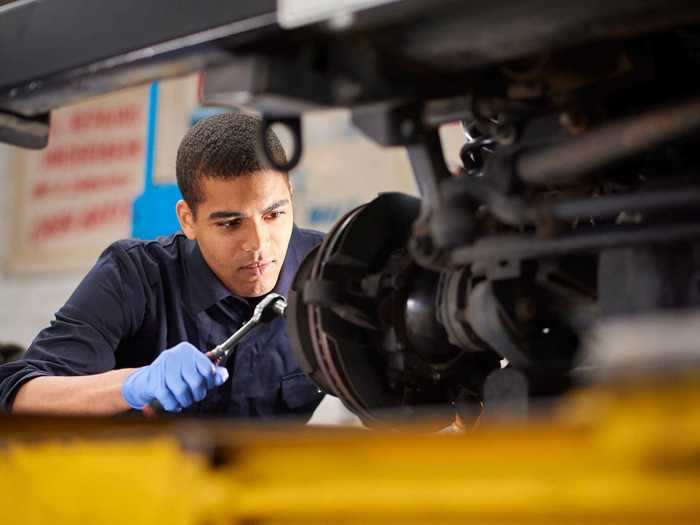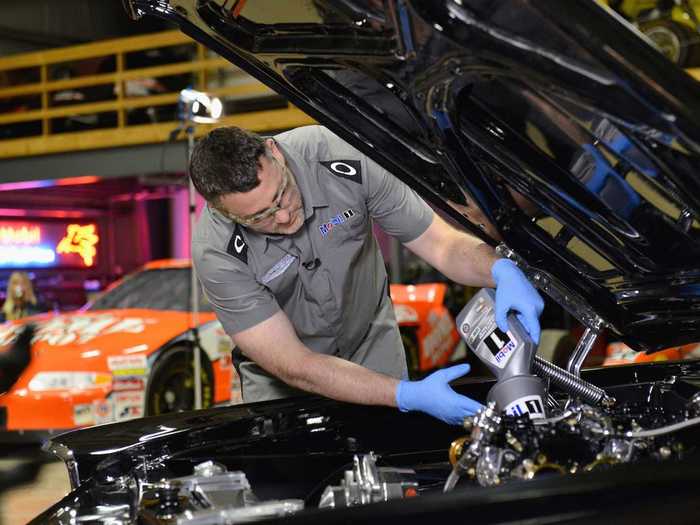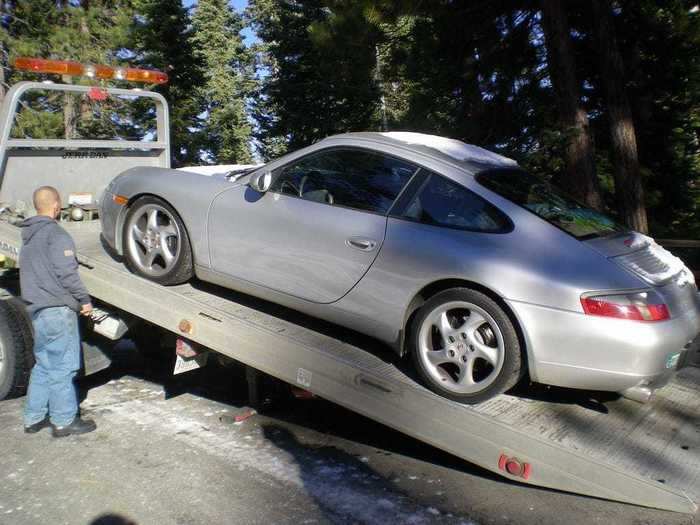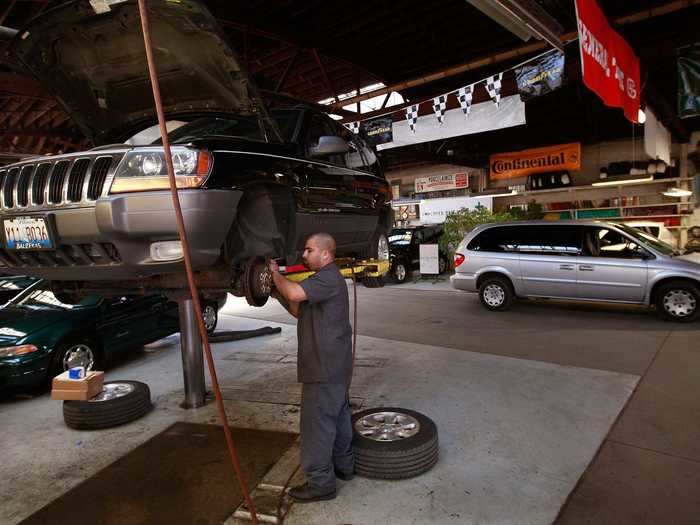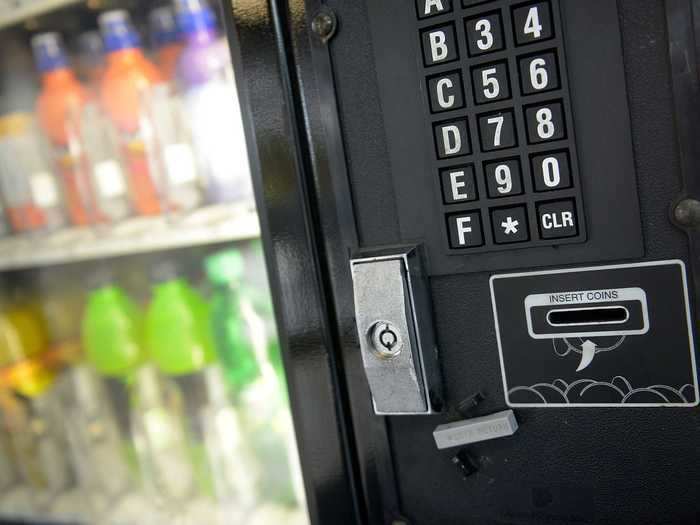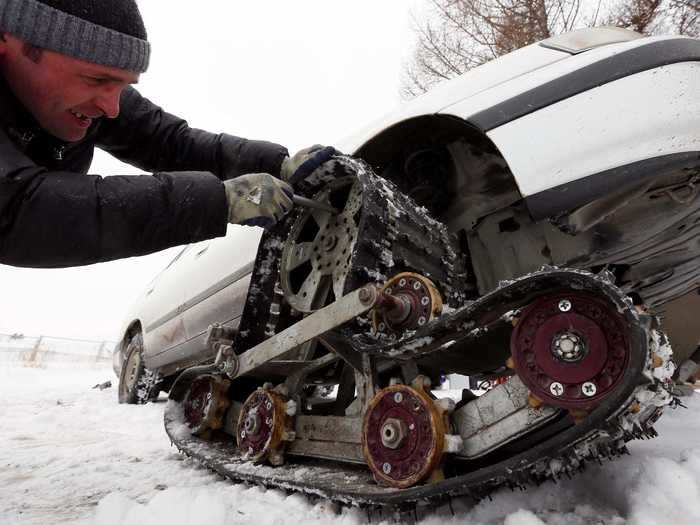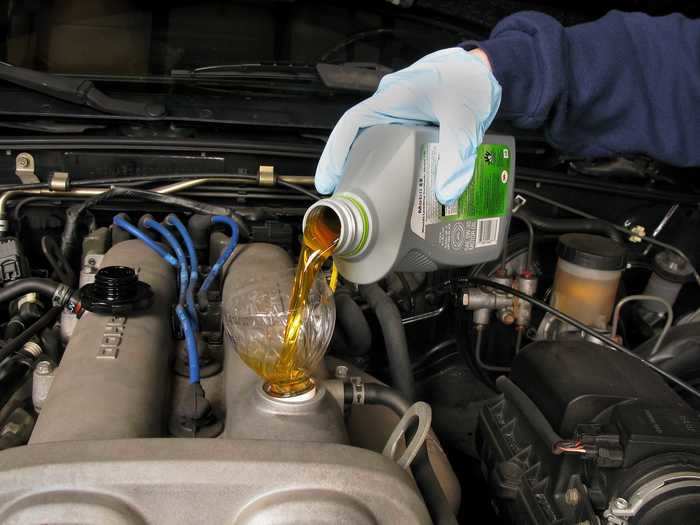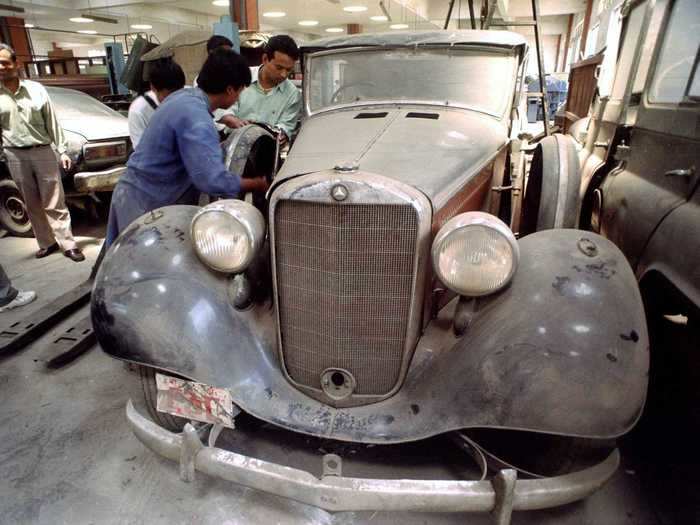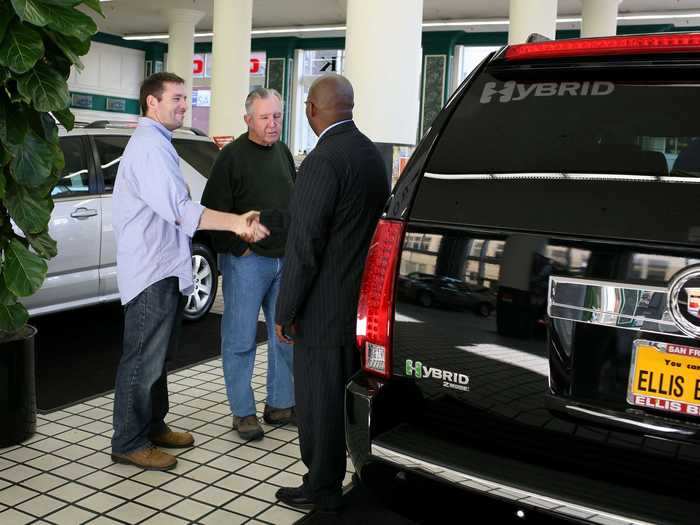Dealership or indie mechanic? The eternal question.Matt Cardy/Stringer/Getty Images
- Dealerships can be expensive, but you shouldn't always avoid them.
- The longer you own your car, the more sense it makes to find your own mechanic.
- DIY-ers will also want to look to indie mechanics.
- In the age of the coronavirus pandemic, both dealership service centers and mechanics are defined as essential, so you can continue to choose between each for your needs.
- Visit Business Insider's homepage for more stories.
Owning a car (or leasing one) means getting your ride serviced and sometimes repaired. Even as the coronavirus pandemic continues to shut down businesses.
Thus, the eternal question: dealership or independent mechanic? Both are considered essential, as people must have operational vehicles.
Each has its pluses and minuses. Dealerships get a bad name — for being expensive and pushing needless service to make money — but the service department of a dealership tends to be up-to-date on your car and in that sense can argue that you get what you pay for.
Indies are often what the real "car guys" endorse, but because they work on a broad range of vehicles, indies can sometimes be digging around to figure out an unfamiliar fix that a dealership could handle more easily.
It's a personal decision. But there are still some tips that can help you choose.
Read the original article on
Business Insider
Don't want to fix every little thing that goes wrong? INDIE MECHANIC.
sturti/Getty Images
My independent mechanic for a number of years often talked me out of fixing stuff. Typically, nonvital features that didn't matter much to the safe operation of my old vehicle.
Dealers are disinclined to do this, but they also have to worry about it less, and they're usually servicing new or gently used cars.
Want to get big discounts on basic service? DEALERSHIP.
Duane Prokop/Getty Images
Oil changes are often on sale at dealerships. They're one of the ways that dealers entice customers to come back to the store, so that those folks are more likely to use the dealership for service in the future.
Ready for a trade-in? DEALERSHIP.
And there comes a time when you're sick of getting your old car fixed.
For you, that means a visit to somebody who can sell you a car and take your old set of wheels as a trade-in. Head for a dealership,
Are you devoted to a particular brand of car? INDIE MECHANIC.
Screenshot via KPCC.org
True, if you love Cadillacs or Mustangs, you can stick with your dealer through thick and thin. And it will be fine.
But the indies just seem to get down into that special thing that makes people passionate about their cars. And for better or worse, a car dealer wants to sell you a new Caddy or 'Stang, not talk to you about how great your 10-year-old model is.
So if you want to bond with your mechanic over a shared affection for vintage Buicks, indie is the way to go. I actively looked forward to hanging out with my Saab mechanic, because I felt like I was going to a sort of Saab clubhouse.
Another plus is that you do get to meet lots of other owners who share your affection for a particular brand. This is the kind of thing that makes getting your car worked on fun, rather than a chore.
Want to avoid traveling to a dealership? INDIE MECHANIC.
Dealerships have the advantages, but they aren't usually conveniently located in town. So if you don't want to take an Uber, Lyft, or taxi back home, or don't like the idea of waiting at the dealership, then going local might be a good plan.
I have four options for such service within walking distance of my house, so I can drop my car off, stroll back home, then meander back to fetch it when the work is done.
Do you want to avoid sitting in a waiting room and drink coffee from a vending machine for five hours? DEALERSHIP.
Getty Images/Bethany Clarke
Dealers can service your car in a day, but you need to be prepared to give that entire day over to the process. Service departments can get busy. I had some basic service done on a Mazda I once owned and it took something like eight hours.
But with the coronavirus pandemic causing major changes, dealerships have begun to space out service appointments and have adapted to social-distancing guidelines by offering touchless dropoff and pickup protocols. I had my Toyota serviced recently by dropping it off and picking it up about three hours later.
You can still wait at the dealership, too. But you'll have to wear a protective mask in many states and observe proper social-distancing behavior.
Indie mechanics generally don't have those things. But they, too, can offer touchless dropoffs and pickups.
Can you work on your car yourself? INDIE MECHANIC.
Assistant Anatoly Lyamtsev replaces the wheels of a car with mechanisms that were designed and produced by Sergei Kasianov, before a test drive on the bank of the frozen Yenisei River during snowfall outside the Russian Siberian city of Krasnoyarsk, February 27, 2015.
Ilya Naymushin/Reuters
One cool thing about working with an indie mechanic is that you often learn a lot about your car. With the dealership, your car disappears for a few hours and is returned to you later, washed and vacuumed.
With an indie, you're more likely to get a breakdown of what's wrong. If it isn't life-threatening, you can always take this diagnostic knowledge (which some indies charge a small amount to amass) and go the do-it-yourself route.
For example, you're having your oil changed and the mechanic notices that you need new brake pads. You could buy the correct pads, watch a YouTube video, obtain the correct tools, and do this job yourself, saving several hundred bucks.
Are you obsessed with regular service intervals? DEALERSHIP.
An oil change makes the engine run smoother.
Robert Couse-Baker/Flickr
If you want to keep careful track of every service you get for your car, from oil changes right on through to timing belts, engine builds, and bodywork, the dealership is your best bet.
The dealer's service department will keep track of when you need recommended service, contact you when the time rolls around, and provide you with documentation in the event that you want to provide this in a private transaction should you decide to sell your car yourself.
Are you a total cheapskate? INDIE MECHANIC.
Nepalese mechanics inspect a 1939 Daimler-Benz
Gopal Chitrakar/Reuters
For years in Los Angeles, I kept an old Saab 900S as my "beater" car.
Stuff was constantly breaking on it, but I wanted to fix only what was absolutely necessary. If it started and the transmission could shift gears, I was good. The sunroof didn't work, a sun visor fell off, as did most of the heater and A/C knobs, the seat heaters and the air conditioning system failed, the power antenna conked out, and the car would stall at idle. It also fired off an endless stream of warning lights.
Because my Saab-specialist indie mechanic had seen it all, he could advise me on what to repair and what to ignore. I wanted to ignore everything, and he wasn't obsessed with making money off me, so we only fixed was was absolutely necessary: battery, brakes, fuel lines, and so on.
The best thing an automotive cheapskate with an old car can do is find an honest independent mechanic. Plus, indie mechanics are almost always cheaper than the dealership (although if they don't know what they're doing, obviously they can be more expensive because you'll have to re-fix whatever they screwed up).
Is your new or lightly used car still under warranty? DEALERSHIP.
Justin Sullivan/Getty
The whole reasons for getting a warranty, which typically covers most but not all things that can go wrong with your car, is so the dealership, through the manufacturer, will have to fix your new ride.
Automakers and their dealers offer different levels of warranty coverage. Hyundai offers 10 years/100,000 miles on the powertrain (engine and transmission) of its cars to create confidence in its burgeoning brand in the US. Other car makers only do 3 years/30,000 (whichever comes first).
Beyond the manufacturer's warranty, you can buy more coverage (an "extended" warranty). Warranties are standard on new and certified pre-owned vehicles, the top of the used-car heap. So if you have one, you might as well use it and have your car worked on at the dealership for any problems.
Additionally, if you lease your cars, it makes the most sense to use the dealership; you're only driving the car for two years, not enough time to worry about something going wrong.
As for basic service, such as oil changes, you can decide for yourself whether to go to the dealership or drive over to Jiffy Lube.

